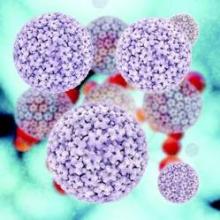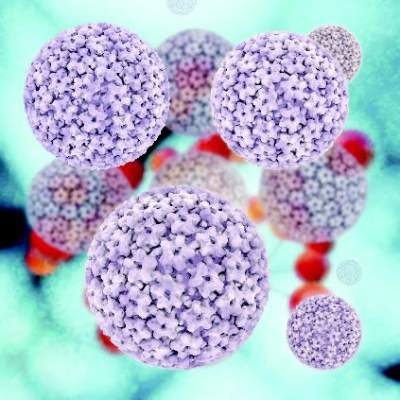User login
One or two doses of the bivalent human papillomavirus vaccine provide a level of protection against cervical HPV infection similar to that of the full three-dose schedule, according to post hoc analysis from two phase III, double-blind, randomized controlled trials with 4 years follow-up.
Data from the Costa Rica Vaccine Trial and PATRICIA trials of the HPV-16/18 vaccine, tested in 24,055 women, showed vaccine efficacy against HPV-16/18 infection for one dose was 85.7%, two doses, 76%, and three doses, 77%, according to a paper published online June 10 in Lancet Oncology.
The analysis also showed that vaccine efficacy was significantly improved in women who received two doses when the second dose was received 6 months after the first, rather than 1 month (Lancet Oncology 2015, June 10 [doi: dx.doi.org/10.1016/ S1470-2045(15)70199-3]). “If one-dose HPV vaccine administration provides strong protection against HPV-16/18 for the long term, this approach might be what is necessary to overcome the barriers prohibiting vaccine uptake in many world regions,” wrote Aimée R Kreimer, Ph.D., of the National Cancer Institute, Bethesda, Md., and her associates. “These data strongly argue for a direct assessment of one-dose efficacy of the HPV-16/18 vaccine.”
Because these results “were replicated in a cohort of women naive to HPV-16/18 infection at the time of vaccination” these results are “probably relevant to girls in the preferred age range for HPV vaccination (i.e., 11-12 years),” they said..
The study and included trials were supported by the U.S. National Cancer Institute, National Institutes of Health Office of Research on Women’s Health, and Ministry of Health of Costa Rica (CVT) and GlaxoSmithKline Biologicals SA (PATRICIA). Some authors disclosed ties with GlaxoSmithKline.
If human papillomavirus vaccines could be delivered as one dose, while retaining their efficacy against the most oncogenic HPV types 16 and 18, we could substantially decrease the global burden of cervical cancer, particularly in resource-poor settings where an annual vaccination program might be difficult to sustain.
Importantly, strong vaccine protection irrespective of dose also was shown for persistent infection, a recommended outcome measure for assessment of protection in prophylactic HPV vaccine trials.
Dr. Julia M.L. Brotherton is from the National HPV Vaccination Program Register, Melbourne. These comments were excerpted from an editorial (Lancet Oncology 2015, June 10 [http://dx.doi.org/10.1016/S1470-2045(15)70253-6]). She declared research grants from bioCSL/Merck.
If human papillomavirus vaccines could be delivered as one dose, while retaining their efficacy against the most oncogenic HPV types 16 and 18, we could substantially decrease the global burden of cervical cancer, particularly in resource-poor settings where an annual vaccination program might be difficult to sustain.
Importantly, strong vaccine protection irrespective of dose also was shown for persistent infection, a recommended outcome measure for assessment of protection in prophylactic HPV vaccine trials.
Dr. Julia M.L. Brotherton is from the National HPV Vaccination Program Register, Melbourne. These comments were excerpted from an editorial (Lancet Oncology 2015, June 10 [http://dx.doi.org/10.1016/S1470-2045(15)70253-6]). She declared research grants from bioCSL/Merck.
If human papillomavirus vaccines could be delivered as one dose, while retaining their efficacy against the most oncogenic HPV types 16 and 18, we could substantially decrease the global burden of cervical cancer, particularly in resource-poor settings where an annual vaccination program might be difficult to sustain.
Importantly, strong vaccine protection irrespective of dose also was shown for persistent infection, a recommended outcome measure for assessment of protection in prophylactic HPV vaccine trials.
Dr. Julia M.L. Brotherton is from the National HPV Vaccination Program Register, Melbourne. These comments were excerpted from an editorial (Lancet Oncology 2015, June 10 [http://dx.doi.org/10.1016/S1470-2045(15)70253-6]). She declared research grants from bioCSL/Merck.
One or two doses of the bivalent human papillomavirus vaccine provide a level of protection against cervical HPV infection similar to that of the full three-dose schedule, according to post hoc analysis from two phase III, double-blind, randomized controlled trials with 4 years follow-up.
Data from the Costa Rica Vaccine Trial and PATRICIA trials of the HPV-16/18 vaccine, tested in 24,055 women, showed vaccine efficacy against HPV-16/18 infection for one dose was 85.7%, two doses, 76%, and three doses, 77%, according to a paper published online June 10 in Lancet Oncology.
The analysis also showed that vaccine efficacy was significantly improved in women who received two doses when the second dose was received 6 months after the first, rather than 1 month (Lancet Oncology 2015, June 10 [doi: dx.doi.org/10.1016/ S1470-2045(15)70199-3]). “If one-dose HPV vaccine administration provides strong protection against HPV-16/18 for the long term, this approach might be what is necessary to overcome the barriers prohibiting vaccine uptake in many world regions,” wrote Aimée R Kreimer, Ph.D., of the National Cancer Institute, Bethesda, Md., and her associates. “These data strongly argue for a direct assessment of one-dose efficacy of the HPV-16/18 vaccine.”
Because these results “were replicated in a cohort of women naive to HPV-16/18 infection at the time of vaccination” these results are “probably relevant to girls in the preferred age range for HPV vaccination (i.e., 11-12 years),” they said..
The study and included trials were supported by the U.S. National Cancer Institute, National Institutes of Health Office of Research on Women’s Health, and Ministry of Health of Costa Rica (CVT) and GlaxoSmithKline Biologicals SA (PATRICIA). Some authors disclosed ties with GlaxoSmithKline.
One or two doses of the bivalent human papillomavirus vaccine provide a level of protection against cervical HPV infection similar to that of the full three-dose schedule, according to post hoc analysis from two phase III, double-blind, randomized controlled trials with 4 years follow-up.
Data from the Costa Rica Vaccine Trial and PATRICIA trials of the HPV-16/18 vaccine, tested in 24,055 women, showed vaccine efficacy against HPV-16/18 infection for one dose was 85.7%, two doses, 76%, and three doses, 77%, according to a paper published online June 10 in Lancet Oncology.
The analysis also showed that vaccine efficacy was significantly improved in women who received two doses when the second dose was received 6 months after the first, rather than 1 month (Lancet Oncology 2015, June 10 [doi: dx.doi.org/10.1016/ S1470-2045(15)70199-3]). “If one-dose HPV vaccine administration provides strong protection against HPV-16/18 for the long term, this approach might be what is necessary to overcome the barriers prohibiting vaccine uptake in many world regions,” wrote Aimée R Kreimer, Ph.D., of the National Cancer Institute, Bethesda, Md., and her associates. “These data strongly argue for a direct assessment of one-dose efficacy of the HPV-16/18 vaccine.”
Because these results “were replicated in a cohort of women naive to HPV-16/18 infection at the time of vaccination” these results are “probably relevant to girls in the preferred age range for HPV vaccination (i.e., 11-12 years),” they said..
The study and included trials were supported by the U.S. National Cancer Institute, National Institutes of Health Office of Research on Women’s Health, and Ministry of Health of Costa Rica (CVT) and GlaxoSmithKline Biologicals SA (PATRICIA). Some authors disclosed ties with GlaxoSmithKline.
FROM LANCET ONCOLOGY

